Why trying to send me to sleep is the big trend of CES
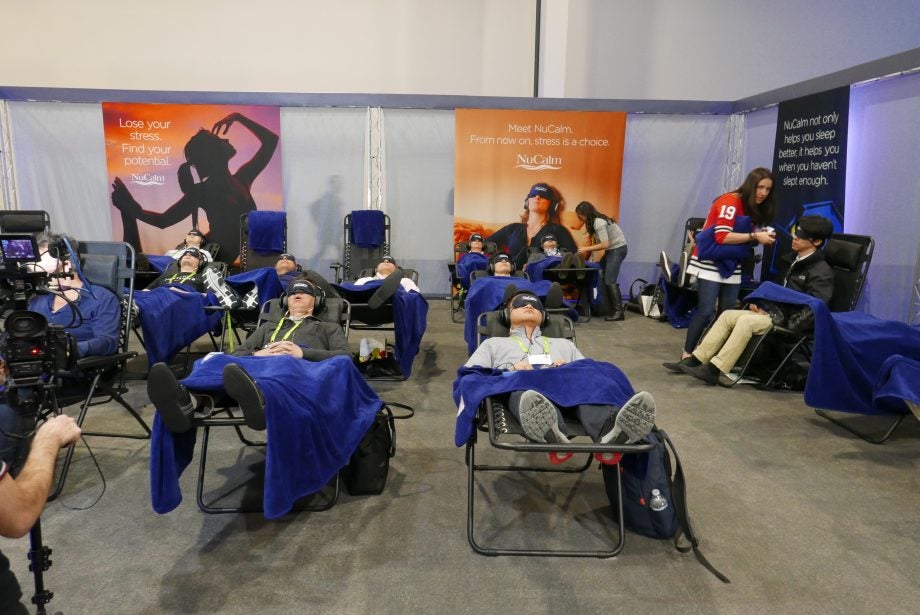
Sleep tracking is included in even your most basic of fitness trackers nowadays. But CES 2018 has shown an increased focus on not only tracking your ZZZs, but also helping to improve your sleep.
When it comes to health and well-being, activity during the day is an important component of leading a healthier lifestyle. But it’s overnight when your body does its physical and mental recovery, so it’s just as important to get a good night’s kip, which should start with one of our best mattresses. A solid night of sleep has also been linked with a range of health benefits, from lower stress levels and improved mental and athletic performance. Those who sleep well also tend to find it easier to lose body fat.
Traipsing the floors of CES, it’s clear that sleep is one of the big focuses of fitness tech in the coming year. Here are some of the more interesting products I’ve seen, from the big players to the plucky upstarts to the plain weird.
Nokia Sleep
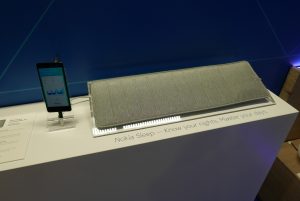
Nokia, formerly Withings, has released a new dedicated sleep-tracking sensor, which is a sort of successor to the Withings Aura. The sensor slips underneath your mattress and detects your movement, while also monitoring for snoring. Its design might be preferable for anyone who doesn’t like wearing a device to bed, as you won’t notice it’s there.
It will deliver the usual sleep cycle breakdown of your sleep, as well as assigning your night a ‘sleep score’, so you can look at ways to improve your overall sleep health. It’s about the quality of sleep, not just the quantity after all.
The Nokia Sleep will work with the Health Mate app and include a Sleep Smarter program that claims to help you achieve 12 minutes of extra sleep a night. That may not sound like much, but it can make a difference. The device will also work with IFTTT integration, which opens up some interesting automation. You can use the Sleep to detect when you get into bed to automatically turn off lights or adjust your Nest thermostat, for example. The Sleep should be out in Q1 this year, and will cost around £100.
Philips SmartSleep

Next up from one of the bigger tech names is the SmartSleep from Philips. This soft headband is designed to be worn while you sleep. It hides away sensors that detect your brain wave activity, so it will know when you’re off in the land of nod. When it detects periods of slow-wave sleep, little speakers will play white noise patterns to help you continue sleeping.
The customised audio tones are meant to enhance the depth and duration of your slow-wave sleep. Of course, there’s also a connected app that will log your sleep metrics and deliver tips and guidance on how to improve your sleep. Philips says that, after wearing the device for two weeks, 70% of its chronically sleep-deprived test subjects said that SmartSleep left them feeling less tired during the day. The SmartSleep will cost $399.99 when it launches in spring in the US.
Related: Best fitness trackers
Dreem
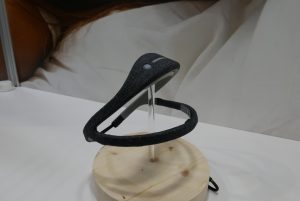
The Dreem, from a French startup, takes a similar approach to the SmartSleep in the sense that it’s a headband you wear overnight. It has a pulse oxymeter for detecting your heart rate and respiration, as well as bone-conducting speakers for delivering its audio, and an accelerometer for detecting movement in the part that goes over your skull. Dedicated sensors are also monitoring brain waves.
Dreem says the device will also help you to fall asleep faster through its sound-based programs that are inspired by meditation, cognitive training and bio-feedback. Once you’re down and out, it will use its audio to keep you sleeping. The addition of that pulse oxymeter could mean it can track and correlate more data than the SmartSleep, but the overall concept is very similar. The inclusion of that extra sensor could go some way to justify the extra cost at $499.99.
Nightingale
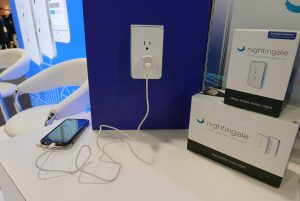
The Nightingale takes an interesting approach in that it doesn’t even have to be close to your bed. It’s a device that plugs into one of your wall sockets and uses sound-masking technology to reduce ambient sounds that will keep you awake at night. Potentially great for anyone who lives near a busy road or noisy neighbours.
A representative told me that the technology isn’t exactly like the active noise cancelling you’ll find in headphones, in that there’s no microphone detecting the external sound. Instead, the Nightingale emits ‘personalised sound blankets’ tailored to the room acoustics and sleep conditions. All this is managed from your smartphone.
Supposedly, these sound blankets are acoustically tuned to reduce the signal-to-noise ratio of outside noise, masking the ones that would otherwise wake you up. How well this actually works would require some testing. The Nightingale is available in a single pack that should support bedrooms up to 150 sq ft for $149 or a twin pack for larger rooms.
ReNu by NuCalm
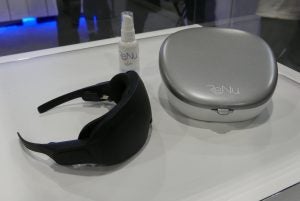
The NuCalm stand at CES was promising that “20 minutes of relaxation is equivalent to 2 hours sleep”, so little wonder there was a long queue to try it out. The ReNu is a more portable version of the NuCalm approach to relaxation. What is NuCalm, you ask? According to the website, it “uses biochemistry, physics, and neurophysiology to rapidly and reliably create deep relaxation so you can feel better, perform better, and live better.”
It uses a combination of a topical cream or chewable supplements that counteract adrenaline. A NuCalm rep told me the cream I rubbed into my neck uses natural amino acids (admittedly, I’m not sure what that really means). Next up is micro-current stimulation to help the NuCalm supplementation. This supposedly reduces the body’s stress response. Finally, neuroacoustic software plays audio to help you to relax. You do all this while wearing an eye mask to block out visual stimuli.
While I didn’t get to try out the ReNu wearable, I did try the standard NuCalm process. The whole experience is a little like one of those flotation tanks you might have seen in an episode of The Simpsons or the film Altered States. The 20 minutes flew by, and by the end I did feel slightly more relaxed – although, admittedly, it might have just been nice to get off my feet having been walking across the show floor all day.
Other notable mentions…

There were plenty of ‘smart pillows’, such as the Zeeq that can track sleep, detect snoring and play music. Then there are the SleepPhones, which are headphones that sit in a headband that you can wear to bed. The Sleep Number is a bed you can adjust in every possible way imaginable. Sensors inside can detect how well you sleep and adjust its firmness and angle to your sleeping. I had a lie on it, and it definitely felt comfortable.
What do you make of the sleep technology on show at CES? Let us know on Facebook or Twitter.


